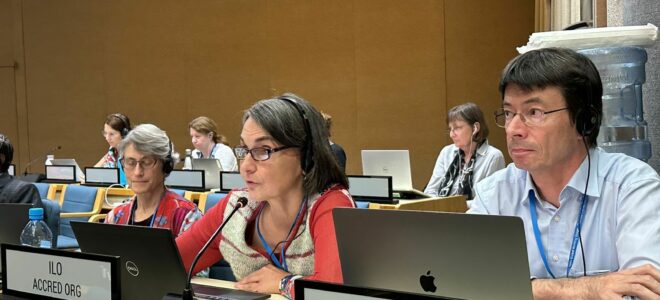The second session of the ad hoc Open-Ended Working Group (OEWG-2) on the Science-Policy Panel on Chemicals, Waste and Pollution Prevention is taking place in Nairobi, Kenya, from December 11 to December 15, 2023. Three IPCP Board Members are in attendance and are providing their daily summaries.
The last day of OEWG-2 again began with a Major Groups meeting, which was co-chaired by IPCP Vice Chair Miriam Diamond and Dalia Marquez, Women’s Major Group. The meeting was very well attended, and the participants prepared a final statement to be delivered in the closing plenary on behalf of the Major Groups and other stakeholders. The group asked IPCP board member Penny Vlahos to deliver the statement in the afternoon plenary.
In the morning plenary, the co-facilitators of contact groups (CGs) (i) to (iii) reported the progress made in the CGs, which concluded the work of these CGs. Next, the results from the contact groups will be integrated into the framework for the new SPP. To this end, the “skeleton outline” (Pre-Session Document OEWG.2/2*) will be enriched with the CG results as summarized in so-called Conference-Room Papers (CRP.2 to CRP.5, available from the In-Session Documents page). At the end of the morning plenary at 12:09, agenda items 4, Preparation of proposals for the establishment of a science-policy panel, and 6, Provisional agenda of OEWG-3, were closed.
Contact group (iv) on intersessional work then met after the plenary to finalize the planning for the intersessional work, which will then form the basis for OEWG-3. However, the meeting of contact group (iv) only made slow progress because one country did not agree on a proposed procedure for country submissions regarding the modified form for reporting conflicts of interest. In the end, a compromise was found and the results of contact group (iv) were presented in the Conference Room Paper 6. A particular concern in this session was that one country questioned the results of contact group (i), which posed the question of whether one contact group can overturn the results of another contact group that has already concluded its work. There was a clear majority in contact group (iv) that this should not be the case. The slow progress in contact group (iv) caused a delay of the closing plenary, which commenced at 4:20 instead of 3 pm.
In the closing plenary, the delegates approved the draft report from OEWG-2 (agenda item 8). Several countries then made concluding statements and appreciated the accomplishments of OEWG-2, but also pointed out how much work lies still ahead. After the member states, also several observers delivered concluding statements. IPCP board member Penny Vlahos delivered the statement on behalf of the Major Groups and other stakeholders, including five points deemed essential by the Major Groups for a successful SPP:
- Diligent conflict-of-interest policies and design for regular evaluations of conflict of interest.
- A human rights-based approach by recognizing the right to a clean, healthy, and sustainable environment as a fundamental operating principle.
- The precautionary approach as a fundamental operating principle.
- An inclusive process through transparent and fully open calls for experts.
- A timely delivery of materials before OEWG-3 of at least 42 days in accordance with UNEA rules to allow better preparation and facilitate efficiency at OEWG-3.
The afternoon plenary, and with it the entire OEWG-2 session, was closed at 5:30 by chair Alkemade. A mix of exhaustion and relief could be felt in the room.
—
Longer daily reports prepared by the International Institute for Sustainable Development, Earth Negotiations Bulletin are available at: https://enb.iisd.org/oewg2-science-policy-panel-contribute-sound-management-chemicals-waste-prevent-pollution
